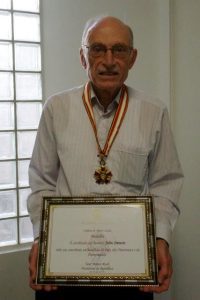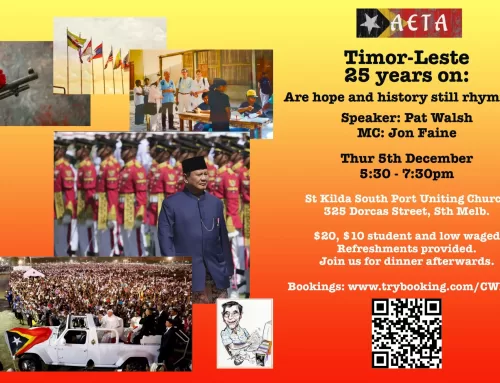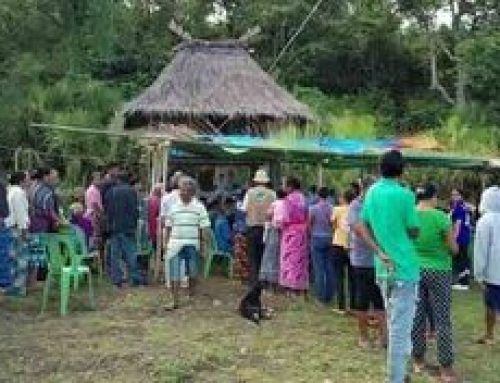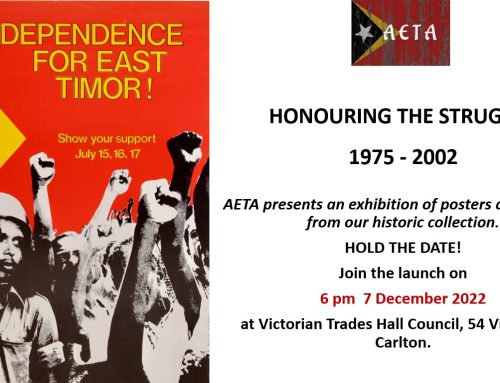
John Sinnott died on Monday 8th January 2024 in the Brotherhood of St. Laurence Aged Care Centre in Clifton Hill where he had been living for the past three years. John was secretary of AETA for nearly 40 years. He was recognised for his dedication to the independence of East Timor, being awarded the Medal of the Order of Timor-Leste in 2014 by Xanana Gusmao.
Reflections on John Sinnott’s Contribution to Solidarity for Timor-Leste,
from the Australia East Timor Association
John Sinnott had been a student of Economics and Politics at Monash University in the late 1960’s, a time when the Vietnam war had a major impact on everyone’s political thinking. He joined the Monash Labor club (along with Jill Jolliffe and Helen Hill among others) where he was a regular campaigner against the war and conscription. After following a career as an Economics teacher for some years in Melbourne high schools, he briefly joined the public service in Canberra in the mid-1970s and became a founding member and secretary of the Australia-East Timor Association group there. On returning to teaching in Melbourne in 1977 he began to have a number of Timorese refugee students in his classes and got to know members of the Timorese community.
He was convinced that the number of books being written on Timor-Leste needed special promotion and that setting up a bookstall would be a good thing for AETA to do. At around the time he moved back to Melbourne, founding members such as David Scott and Bill Roberts were stepping back from the committee and John Sinnott became Secretary. Throughout the so-called ‘quiet 80’s John Sinnott, Jean McLean, George Preston and Ian Bell were almost the only AETA members keeping the organization going, regularly making statements on the war in Timor and organizing demonstrations outside the Indonesian consulate on significant days. John also maintained contact with Jose Ramos Horta and the Diplomatic Front, facilitating their visits around Australia to speak to supporters.
Due to John’s diligence an AETA Dinner was held every year on the 28th November the anniversary of the Declaration of Independence, despite small attendance in some years. John also co-ordinated with other Timor activities going on in Melbourne in the 1980s including the relatives of the Balibo 5, John Waddingham’s Timor Information Service, some of the 2nd World War Commandos who had served in Timor, the Australian Council for Overseas Aid (ACFOA)’s Human Rights office with Pat Walsh, the Timorese Association of Victoria (TAV) and the Timorese Ethnic Chinese of Victoria (TEC-Vic). He is fondly remembered by the many Timorese he helped in the early days to get their struggle recognised by Australians.
John was a passionate supporter of independence in all the Portuguese-speaking countries which were coming to independence after the Carnation Revolution of 1975. He was also secretary of the Australia-Mozambique Association (AMOZA). He started learning Portuguese, which is how he met the love of his life, Marisa, from Brazil, who sadly died of cancer ten years ago. He later went to Brazil and visited her family.
Things changed in the early 1990s, with Max Stahl’s filming of the Santa Cruz Massacre and in April 1994 with John Pilger’s TV film Death of a Nation: The East Timor Conspiracy. John Pilger placed a condition on the screening of his film that local Timor solidarity groups be allowed to advertise a phone number where they would take calls immediately afterwards, So Channel 9 contacted John Sinnott and invited AETA to do so in Melbourne on Aprill 7th 1994. By this time Helen Hill had returned to Melbourne and was chair of AETA so she and John took phone calls that night from people offering financial support, to attend a demonstration or to become a member. This was the beginning of an expansion phase for AETA which John oversaw. As someone trained in accounting, he was very good at paying attention to detail.
John promoted national and international co-ordination with other groups working with the Diplomatic Front. Together with Carmel Budiardjo of TAPOL in London, Charlie Scheiner and John Miller of the East Timor Action Network in New York he was a founding member of IFET (International Federation for East Timor). He travelled to Sydney and recruited the late Dr Andrew McNaughtan as secretary for a NSW branch of AETA and to Brisbane where he recruited the filmmaker Gil Scrine in a similar role.
He also co-ordinated with groups in Adelaide and Perth and made sure they all had books to sell at their rallies and meetings. He worked with diaspora Timorese Koneng Lay, to help him translate all the messages and emails from ETAN in New York so they could be broadcast on Community Radio 3CR for the Timorese Community.
When Timor-Leste was able to hold its referendum and have its independence restored John made his only visit to Timor-Leste for the May 20th 2002 ceremony as a guest of Jose Ramos Horta (whom he had hosted many a time in the early years of the struggle). He was awarded the Medal of the Order of Timor-Leste in 2014 but as he was unable to travel to Timor-Leste it was presented in Melbourne by Xanana Gusmao.
It is thanks to a lot of hard work by John Sinnott that AETA exists today in such a vibrant manner. He put in a lot of time, together with John Gunson, for getting AETA Incorporated as a legal entity in 2014. Many people believed that after Timor-Leste got self-determination the solidarity movements would fade away. But people were even more keen than ever to get information on who is doing what in Timor-Leste, how they can help etc. It was always John’s vision that AETA not be a fund-raising or project implementing body, but that information is its strategic resource, providing a valuable place for other organizations doing these things to come together, talk and advocate!
Helen Hill and Jean McLean


